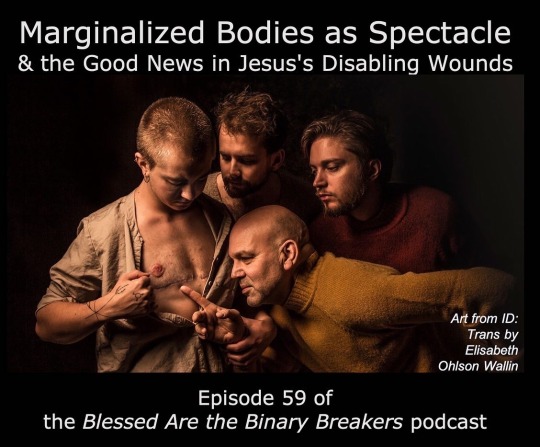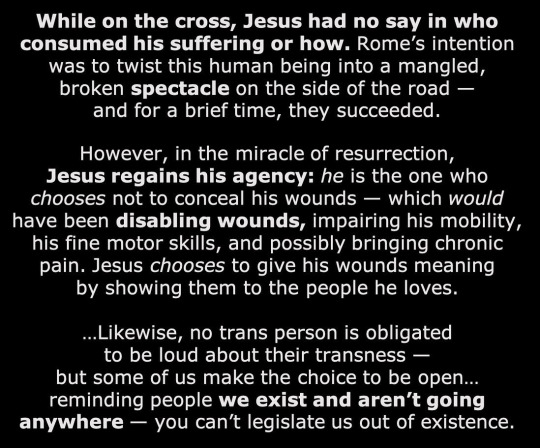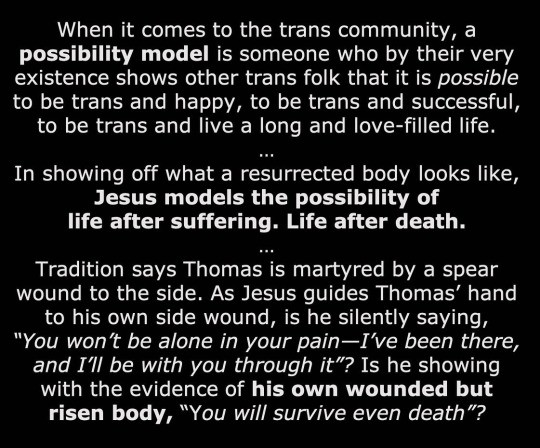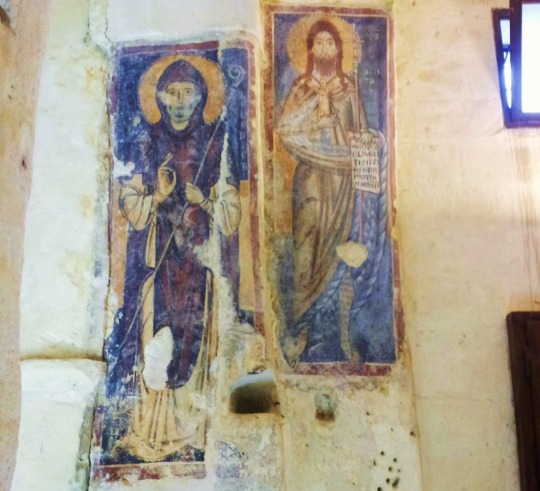#John 20
Text

John 20:30-31
Jesus performed many other signs in the presence of his disciples, which are not recorded in this book. But these are written that you may believe that Jesus is the Messiah, the Son of God, and that by believing you may have life in his name.

35 notes
·
View notes
Text

"Blessed are those who have not seen and yet still believed."
--John 20:29
Photo: Asheville, North Carolina
#spring#spring flowers#daffodils#yellow flowers#purple flowers#springtime#north carolina#nc#asheville#biltmore estate#garden#the tarheel state#blue ridge parkway#blue ridge mountains#road trip#travel#adventure#explore#tourism#the south#southern usa#john 20#believe#john 20:29#holy week#easter#bible verse#the holy bible#god's word#holy scripture
13 notes
·
View notes
Text
Easter - Part 1
”The first day of the week cometh Mary Magdalene early, when it was yet dark, unto the sepulchre, and seeth the stone taken away from the sepulchre. Then she runneth, and cometh to Simon Peter, and to the other disciple, whom Jesus loved, and saith unto them, They have taken away the Lord out of the sepulchre, and we know not where they have laid him.
Peter therefore went forth, and that other disciple, and came to the sepulchre. So they ran both together: and the other disciple did outrun Peter, and came first to the sepulchre. And he stooping down, and looking in, saw the linen clothes lying; yet went he not in. Then cometh Simon Peter following him, and went into the sepulchre, and seeth the linen clothes lie, and the napkin, that was about his head, not lying with the linen clothes, but wrapped together in a place by itself. Then went in also that other disciple, which came first to the sepulchre, and he saw, and believed.
For as yet they knew not the scripture, that he must rise again from the dead. Then the disciples went away again unto their own home.“
John 20:1-10 KJV
6 notes
·
View notes
Quote
Jesus performed many other signs in the presence of his disciples, which are not recorded in this book. But these are written that you may believe that Jesus is the Messiah, the Son of God, and that by believing you may have life in his name.
John 20:30-31 NIV (2011)
#bible verse#christianity#the bible#life of Jesus#miracles#signs#disciples#faith#books#biblio#biblion#trust#messiah#son of God#life#john 20#new international version
27 notes
·
View notes
Text


In Jesus, God rose with wounds that would have impaired his mobility and fine motor skills. In John 20, Jesus allows his disciples to gaze at his impaired body, and even lets Thomas touch his wounds. Let's explore how this story connects to the complications of marginalized bodies being put on display for public consumption — of being made into a spectacle.
Find this ep wherever you get podcasts, or visit www.blessedarethebinarybreakers.com/podcast-archive for links + and episode transcript!
Image descriptions in alt text.

Part of this episode explores an art piece by Elisabeth Ohlson Wallin — a photograph of Jesus with top surgery scars — that you can view here.
Or view it and other images, with image descriptions, in the episode transcript.
The episode also draws from S. Bear Bergman's 2021 article "Please Come and Be Fat."
The episode ends with Rebekah Anderson's meditation "The Body of God."
A previous episode of this podcast also delves into the John 20 story of Jesus and Thomas through a trans and disabled lens — episode 40, "Goodness Embodied: An Intersex, Nonbinary First Human and a Disabled Risen Christ."
If you want to watch the sermon that this ep is based off of, visit here.
___
TALKING POINTS:
(0:00 - 3:36) - Introducing the topic: based off a sermon; Jesus's disabling wounds & marginalized bodies as spectacle
(3:37 - 6:30) - Affirmation of Faith in God the seamstress, the wounded Christ
(6:31 - 9:59) Introducing & reading John 20:19-29
(10:00 - 15:59) Identifying our experiences with Christ's — medieval labor pains; Jesus with top surgery scars
(16:00 - 21:52) - Possibility models: proving it's possible to be trans and successful & happy; Jesus proving there is life after suffering & death
(21:53 - 23:51) - Jesus on the cross was forced to be a spectacle; the resurrected Jesus has regained his agency, chooses to share his wounds
(23:52 - 26:10) - "Blessed are those who haven't seen and believe" — parallel with a friend's chronic illness & being believed
(26:11 - 29:18) - risking vulnerability — visibility politics in trans & disabled communities
(29:19 - 33:48) - The risen wounded Christ proves once and for all that what the world calls shameful & broken is not incompatible with the divine
(33:49 - end) - "Imagine the body of God...God has every ability, and every disability in the world"
#blessed are the binary breakers#faithfullylgbt#trans theology#disability theology#trans christians#disabled christians#podcast#log#spring 2022#John 20
81 notes
·
View notes
Text

The Purpose of John’s Gospel (and of the complete Holy Bible):
Jesus performed many other signs in the presence of his disciples, which are not recorded in this book. But these are written that you may believe that Jesus is the Messiah, the Son of God, and that by believing you may have life in his name.
John 20:30-31
#thomas#little#twin#believe#no doubt#read#holy#bible#gospel#of#john#chapter#20#john 20#jesus#is#lord#messiah#son of God#point#omega
7 notes
·
View notes
Text


THANK YOU LORD. Jesus never said he would leave us a BOOK, The Bible is man made..Christ said he’d gift us with the companionship of THE HOLY SPIRIT which is LIVING TRUTH; his power &The Most Highs combined into one omnipotent unfathomable divine entity. Christ’s martyrdom; story of betrayal and costly sacrificial spiritual weight strengthens your connection to Higher Powers if you truly believe in the faithfulness of fate. THE HOLY SPIRIT IS ALIVE &REAL. And has been around B.C..If you seek, you shall find the light. I’m so thankful to be chosen &blessed. GOD YOU ARE SO GOOD !!
#tell me where you laid him#I will go and get him!#this verse always makes me cry#and there 3 Mary’s#that Mary was his girlfriend#it’s not about the Bible#I believe in CHRIST#revelation#resonation#I HAVE SEEN THE LORD#♥️#Passover#John 20#resurrection#ascension
4 notes
·
View notes
Text
John 20:19–23
19 Οὔσης οὖν ὀψίας τῇ ἡμέρᾳ ἐκείνῃ τῇ μιᾷ σαββάτων καὶ τῶν θυρῶν κεκλεισμένων ὅπου ἦσαν οἱ μαθηταὶ διὰ τὸν φόβον τῶν Ἰουδαίων, ἦλθεν ὁ Ἰησοῦς καὶ ἔστη εἰς τὸ μέσον καὶ λέγει αὐτοῖς· εἰρήνη ὑμῖν. 20 καὶ τοῦτο εἰπὼν ἔδειξεν τὰς χεῖρας καὶ τὴν πλευρὰν αὐτοῖς. ἐχάρησαν οὖν οἱ μαθηταὶ ἰδόντες τὸν κύριον. 21 εἶπεν οὖν αὐτοῖς [ὁ Ἰησοῦς] πάλιν· εἰρήνη ὑμῖν· καθὼς ἀπέσταλκέν με ὁ πατήρ, κἀγὼ πέμπω ὑμᾶς. 22 καὶ τοῦτο εἰπὼν ἐνεφύσησεν καὶ λέγει αὐτοῖς· λάβετε πνεῦμα ἅγιον· 23 ἄν τινων ἀφῆτε τὰς ἁμαρτίας ἀφέωνται αὐτοῖς, ἄν τινων κρατῆτε κεκράτηνται.
My translation:
19 Being, then, late on that day, on day one of the week, and the doors having been shut where the apprentices were on account of the fear of the Judeans, Yeshua came and stood into the midst and he says to them, “Peace to you.” 20 And having said this, he showed his hands and his side to them. The apprentices, therefore, rejoiced seeing the lord. 21 He [Yeshua], therefore, said to them again, “Peace to you; just as the Father has sent me, I also am sending you.” 22 And having said this, he blew on them and says to them, “Receive Holy Breath; 23 if you let go of the sins of any, they have been let go of, if you hold on to the sins of any, they have been held on to.”
Notes:
20:19
οὖν is probably transitional, but is omitted in most translations.
κλείω (16x) is, “I close, shut”; here: “lock”. The present genitive participle οὔσης (from εἰμί) with ὀψίας (“late”; subst.: “evening”; see note on 6:16) and the perfect genitive participle κεκλεισμένων with τῶν θυρῶν form a compound genitive absolute construction: “When it was evening ... and the doors were locked”. οὔσης ὀψίας is genitive due to the implied term ὥρα. The construction is temporal with the main verbs ἦλθεν ... καὶ ἔστη below. The fact that John calls it the first day of the week even though it was evening (i.e., after sundown) shows that he is here using Roman time and not Jewish.
τῇ ἡμέρᾳ, modified by attributive far-demonstrative pronoun ἐκείνῃ, is a dative of time with οὔσης above. τῇ μιᾷ σαββάτων (“on the first day of the week”; see note on v. 1) stands in apposition to τῇ ἡμέρᾳ ἐκείνῃ.
The clause introduced by the spatial particle ὅπου modifies τῶν θυρῶν above. The subject of the imperfect ἦσαν (from εἰμί) is οἱ μαθηταὶ.
The prepositional phrase διὰ τὸν φόβον is causal with κλείω above. The genitive τῶν Ἰουδαίων is objective.
ὁ Ἰησοῦς is the subject of the 2nd aorist ἦλθεν (from ἔρχομαι) and the aorist ἔστη (from ἵστημι). The articular accusative neuter adjective τὸ μέσον is substantival. Although the prepositional phrase εἰς τὸ μέσον modifies ἵστημι, the choice of εἰς (instead of ἐν) is influenced by the notion of movement from ἔρχομαι.
ὁ Ἰησοῦς is also the subject of the historical present λέγει (from λέγω) and αὐτοῖς, referring to the disciples is the indirect object.
εἰρήνη can be regarded as the subject of an implied optative εἴη and ὑμῖν the indirect object (“May peace be to you”).
20:20
The near-demonstrative pronoun τοῦτο, referring to “Peace to you” (v. 19), is the direct object of the 2nd aorist participle εἰπὼν (from λέγω) which is temporal-antecedent (“After he said this”) with the aorist ἔδειξεν (from δείκνυμι “I show”), whose compound direct object is τὰς χεῖρας καὶ τὴν πλευρὰν (“side”; see note on 19:34). αὐτοῖς, referring to the disciples, is the indirect object. Jesus is the unexpressed subject of the verb.
Most translations render οὖν as transitional (“Then”).
The subject of the 2nd aorist passive ἐχάρησαν (from χαίρω) is οἱ μαθηταὶ. The passive form of χαίρω is equivalent to the active (cf. 8:56). The 2nd aorist participle ἰδόντες (from ὁράω) is temporal/causal with χαίρω (“they rejoiced when they saw him” = “they rejoiced because they saw him” in English idiom). τὸν κύριον is the direct object of the participle.
20:21
NASB, NET render οὖν as inferential (“So”).
The indirect object of the 2nd aorist εἶπεν (from λέγω) is αὐτοῖς, referring to the disciples, and [ὁ Ἰησοῦς], if original, is the explicit subject. The verb is modified by the temporal adverb πάλιν.
For εἰρήνη ὑμῖν, see note on verse 19.
The καθὼς ... κἀγὼ construction (“Just as ... I also”) correlates God’s sending of Jesus with Jesus’s sending of us.
The direct object of the perfect ἀπέσταλκέν (from ἀποστέλλω) is με and the subject is ὁ πατήρ. The perfect-tense of the verb implies the ongoing mission of Jesus.
κἀγὼ is the subject of the present πέμπω and ὑμᾶς is the direct object.
20:22
For καὶ τοῦτο εἰπὼν, see note on verse 20.
The hapax legomenon ἐμφυσάω is, “I breathe on [someone]” (BDAG); an object must be supplied in translation (“on them”). Since this verb is the same one used in the LXX of Genesis 2:7 and Ezekiel 37:9, ‘it is appropriate to detect new creation symbolism here’ (EGGNT). Jesus is the unexpressed subject of the aorist ἐνεφύσησεν and the historical present λέγει (from λέγω). αὐτοῖς, referring to the disciples, is the indirect object of λέγω. Consult various commentaries for theories regarding the relationship of this event with Pentecost.
The direct object of the 2nd aorist imperative λάβετε (from λαμβάνω) is πνεῦμα, modified by attributive ἅγιον. Most translations supply the article (“receive the Holy Spirit”), although the anarthrous construction (not uncommon in the NT with the Holy Spirit) may see the Spirit as a sort of substance as well as a person. CGT, on the other hand, takes the anarthrous noun as ‘to imply that the gift is not made in all its fulness.’
20:23
The particle ἄν here is best taken as equivalent to ἐάν, introducing a third-class conditional statement. The indefinite pronoun τινων is subjective with τὰς ἁμαρτίας (“the sins of anyone”), which is the direct object of the aorist subjunctive ἀφῆτε (from ἀφίημι; subj. after ἄν/ἐάν). Alternatively, ἄν could make τινων more indefinite (EGGNT), in which case the sense would be, “You may forgive the sins of anyone whatsoever; they are forgiven.”
In the apodosis of the condition, “their sins” is the unexpressed subject of the perfect passive ἀφέωνται (from ἀφίημι); ἀφίημι takes a dative of the person forgiven, here αὐτοῖς. With perfect verb and the one below, the aspect may be stative and does not necessarily mean that the forgiveness in heaven precedes the forgiveness on earth.
For ἄν, see above. The indefinite pronoun τινων modifies an implied τὰς ἁμαρτίας, which is the direct object of the present subjunctive κρατῆτε (from κράζω; subj. after ἄν/ἐάν). κράζω has the sense, “hold on to”; most translations: “retain”; this sense of κράζω is the opposite of the literal meaning of ἀφίημι, “I let go of”. Compare the present-tense here with the aorist above.
In the apodosis of the condition, “their sins” is the unexpressed subject of the perfect passive κεκράτηνται (from κράζω).
0 notes
Text
Jesus Shows Up (John 20:19-31)
When Jesus shows up, there is peace.
The Doubt of St. Thomas, by He Qi
It was still the first day of the week. That evening, while the disciples were behind closed doors because they were afraid of the Jewish authorities, Jesus came and stood among them. He said, “Peace be with you.”After he said this, he showed them his hands and his side. When the disciples saw the Lord, they were filled with joy.Jesus said to them again, “Peace…

View On WordPress
#apostle thomas#believe#christ&039;s disciples#christian disciples#christian discipleship#christian life#christianity#christocentric#eastertide#faith#gospel of john#holy spirit#jesus christ#john 20#light of christ#peace#presence of christ#risen christ#risen lord#witness
0 notes
Text
JOHN S.O.A.P. ~ CHAPTER 20
Monday, 4/1/24
SCRIPTURE:
Jesus said to them again, “Peace be with you. As the Father has sent Me, I also send you.”
~ John 20:21
OBSERVATION:
This sounds "encouraging" and all that...
...but how was Jesus sent by the Father?
Humbly -
born in a manager...
raised in the capital of the middle of nowhere...
in His service...
in His Father's Word...
Boldly -
in His message...
in His service...
in His Father's Word...
Sacrificially -
His life for others - for mine...
in His service to others - not just His disciples (friends and family)...
in His obedience to His Father's Word...
in His Father's will in stead of His Own...
Still, He had to tell them yet again...
to calm their "post-crucifixion" anxiety and fears ("Peace be with you...")
to step out humbly and boldly in the ways He had shown them... ("As the Father...sent [Him]...)
Personalizing this verse becomes: "Peace - His peace - is with me. As the Father sent Him, so He also sends me..."
APPLICATION:
Go -
humbly...
boldly...
peacefully, peaceably...
sacrificially...
in Him as His...
Live "sent..."
PRAYER: (Including a reference to verse 14)
Heavenly Father God - I confess to often trying to make my own peace, and ask Your forgiveness for forgetting Jesus's example of bold humility... for turning around and not realizing His presence in all things at all times... Thank You for His example of living and going in Your Power, and may I go about my day-to-day, minute-to-minute thoughts and actions sent in the same way You sent Him... for You and others first... In His Name, and gratefully for Your grace and to give You all the glory...
Humbly yours - boldly in Him...
𝖌
<))><
0 notes
Text

John 20:24-29
Now Thomas (also known as Didymus), one of the Twelve, was not with the disciples when Jesus came. So the other disciples told him, “We have seen the Lord!”
But he said to them, “Unless I see the nail marks in his hands and put my finger where the nails were, and put my hand into his side, I will not believe.”
A week later his disciples were in the house again, and Thomas was with them. Though the doors were locked, Jesus came and stood among them and said, “Peace be with you!” Then he said to Thomas, “Put your finger here; see my hands. Reach out your hand and put it into my side. Stop doubting and believe.”
Thomas said to him, “My Lord and my God!”
Then Jesus told him, “Because you have seen me, you have believed; blessed are those who have not seen and yet have believed.”

2 notes
·
View notes
Text
He is Risen! Cling to Him! Sunday Devotional
Matthew 28: 8-10 So the women hurried away from the tomb, afraid yet filled with joy, and ran to tell his disciples. Suddenly Jesus met them. “Greetings,” he said. They came to him, clasped his feet and worshiped him. Then Jesus said to them, “Do not be afraid. Go and tell my brothers to go to Galilee; there they will see me.John 20: 17-18 Jesus said, “Do not hold on to me, for I have not yet…
View On WordPress
#Sunday Devotion#Christian blog#Christian blogger#Encouragement#Faith#Hope#inspiration#Jesus Christ the Lord#John 20#Joy#Matthew 28#Resurrection#Salvation#Trust in the Lord
0 notes
Text
Live Stream Sunday School - December 10, 2023
John 20:1-10
#sunday #sundayschool #livestream #John #Peter #Jesus #MaryMagdalene #Mary #Body #wrapping #linen #faith #tomb #HeisRisen #risen #believe #SonofGod #Messiah #account #akron #akronohio #thealliance
youtube
View On WordPress
#body#faith#He is risen#Jesus#John#John 20#linen#livestream#Mary#Mary Magdelene#Messiah#Peter#risen#Son of God#tomb#wrapping#Youtube
0 notes
Text
Church notes - 3rd September 2023
3rd
John 3:16, 17
Communion
Isaiah 53
Sermon
Matthew 25:31 - 46
Created for Ministry
Ephesians 2:20
You were made to make a contribution, not just to consume.
Ephesians 2:10
Called to Ministry
1 Peter 2:9, 10
Gifted for Ministry
1 Peter 4:10
Commanded to Minister
Matthew 20:22 - 26
What do you do about it?
Matthew 16:27
It is important that we meet the physical needs of those around us.
Simple acts of kindness.
Things that take the focus off ourselves and onto others.
Made for a mission - to share the Good News with others.
John 20:21
Acts 1:8
We're to tell others about God and His role in our lives. To share to Gospel.
Luke 8:38, 39
2 Peter 3:9
We need to reach people who are out of our world.
Like the Samaritans.
1 Corinthians 9:22
We are tasked to build bridges, not walls.
Is anybody going to be in heaven because of you?
#1 corinthians#1 corinthians 9#1 peter#1 peter 2#1 peter 4#2 peter#2 peter 3#acts#acts 1#church#ephesians#ephesians 2#gospel of john#gospel of luke#gospel of matthew#isaiah 53#john 20#john 3#matthew 16#matthew 20#matthew 25
0 notes
Text

I keep Twitter around for 1 reason
#make some noise#dropout#erika ishii#john green#hank green#dimension 20#Adjacent because#brennan lee mulligan
5K notes
·
View notes
